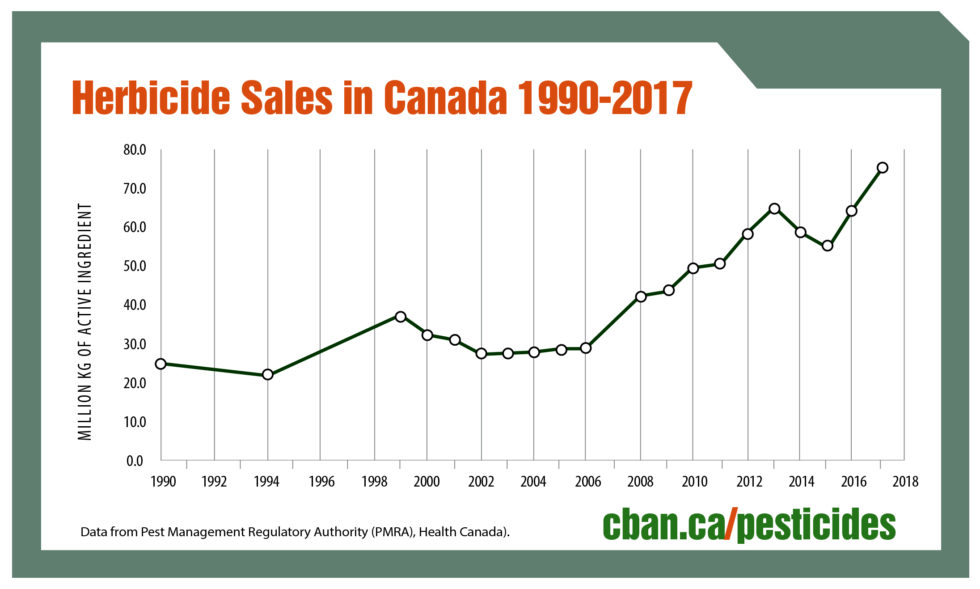CBAN - June 2020
June 2020: A U.S. court overturned the registration of the herbicide dicamba, because of the “enormous and unprecedented” damage to neighbouring crops from pesticide drift. The court ruling means that three dicamba formulations – sold by Monsanto (Bayer), BASF, and Corteva (Dow-Dupont) – are now illegal, and their associated genetically engineered (genetically modified or GM) dicamba-tolerant seeds are irrelevant. However, the U.S. Environmental Protection Agency (EPA) – the regulator responsible for allowing registration – has responded by allowing U.S. farmers to use up their existing stocks of dicamba. In 2017, Monsanto (now Bayer) introduced a new dicamba formulation to be sold along with the company’s new GM dicamba-tolerant seeds. About two-thirds of the soybeans and three-quarters of the cotton planted by U.S. farmers is now dicamba-tolerant.
Herbicide Sales Increased 243% (1994-2017)
Health Canada information shows an increase in herbicide sales of 243% from 1994-2017. The first genetically engineered herbicide-tolerant crops were introduced in 1995.

Call to Re-think Genetically Engineered Herbicide-Tolerant Crops
August 2019: The Canadian Biotechnology Action Network (CBAN) and Prevent Cancer Now (PCN) are calling for a review of the use of genetically engineered (genetically modified or GM) herbicide-tolerant crops in Canada, in response to Monsanto’s request for government approval of GM corn MON 87429 that can withstand applications of four herbicides, including 2,4-D and dicamba.
- Click here to read the press release: “Call to Re-think Genetically Engineered Herbicide-Tolerant Crops: Proposed Monsanto corn tolerates four herbicides”, CBAN and Prevent Cancer Now, August 22, 2019.
- Click here to read the comments on MON 87429 submitted to the Canadian Food Inspection Agency by CBAN and PCN.
- Click here for more information on 2,4-D- and dicamba-tolerant crops.
Glyphosate gives way to dicamba and 2,4-D
As glyphosate-resistant weeds spread across North America and the herbicide glyphosate consequently loses its usefulness as a weedkiller, Monsanto (now Bayer) is replacing its GM glyphosate-tolerant soy with GM dicamba-tolerant soy. In the US, the new dicamba-tolerant varieties are increasing the use of the herbicide dicamba. Bayer says its new dicamba formula is less prone to herbicide drift but, across the US, neighbouring crops that are not dicamba-tolerant are being damaged. This is leading many farmers to buy GM dicamba-tolerant seeds as a strategy to protect their crops. Bayer estimates that U.S. farmers will plant about 50 million acres of dicamba-tolerant soybeans in 2019, 60% of all the soybeans planted in the country. Corteva (DowDuPont) says it will widely launch its 2,4-D-tolerant soy in Canada in 2020, with some sales in 2019. Click here for some background on 2,4-D- and dicamba-tolerant crops
Glyphosate is a “probable human carcinogen”
In 2015, the International Agency for Cancer Research (IARC) of the World Health Organization (WHO) concluded that:
- Glyphosate, the world’s most-used chemical ingredient for weed control, is a “probable human carcinogen” (March 2015)
- 2,4-D, the second most-used herbicide in Canada, is a “possible human carcinogen” (June 2015)
